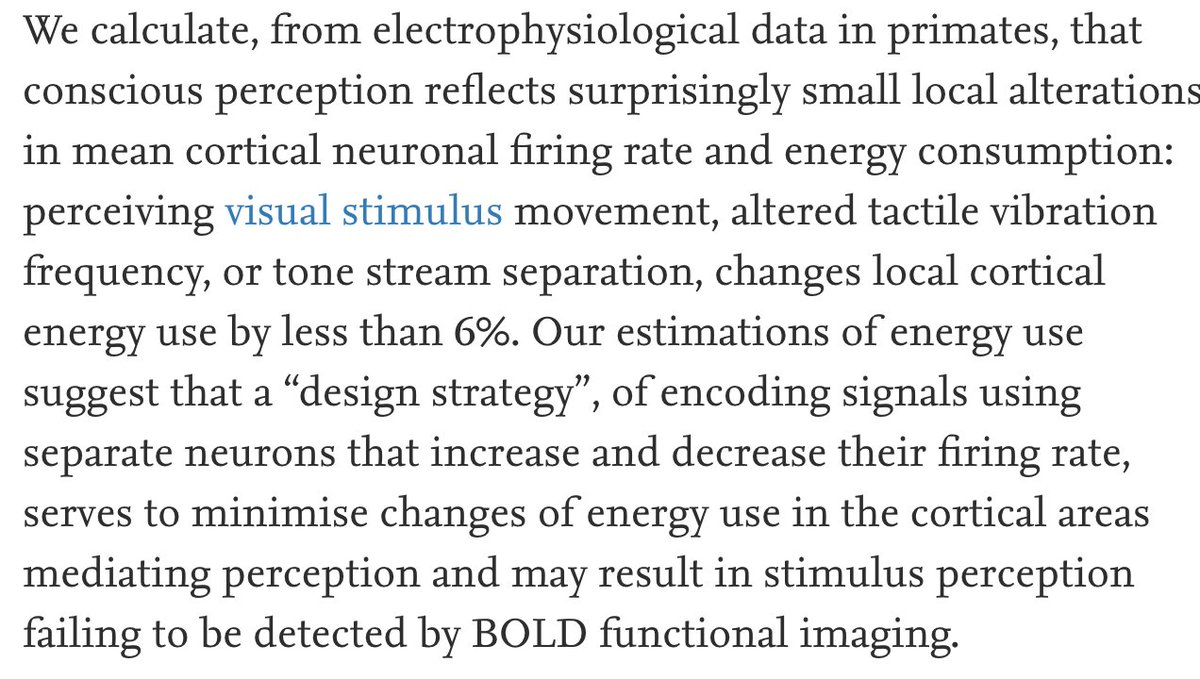Hot take that I would like pushback on from people in the field: I think fMRI as a technique for probing cognition is not just useless but worse than useless as it provides the illusion of understanding at high effort and cost
fMRI doesn& #39;t directly measure "brain activity"- it specifically measures whether the hemoglobin in blood in a particular spatiotemporal region is or is not bound to oxygen. the two states behave differently under different magnetic perturbations (hence "magnetic resonance")
the argument for the use of this technique in cognitive science is roughly:
(1) neurons recruited for a specific cognitive task consumer more energy
(2) that energy consumption impacts local blood oxygenation
(3) this impact can be used to infer the relevance of that area
(1) neurons recruited for a specific cognitive task consumer more energy
(2) that energy consumption impacts local blood oxygenation
(3) this impact can be used to infer the relevance of that area
i think all of these steps are wrong. let& #39;s start with (2). I realized while typing this out that I& #39;m not sure what impact to expect. If metabolism goes up, the immediate effect would be deoxygenating the blood...
But the body is an adaptive system! If an area is using more oxygen, it will route more oxygenated blood to that area. So if I have an fMRI reading that shows one region of the brain is deoxygenated and another is hyperoxygenated, which is "activated" and which is "suppressed"?
Now back to (1). it may seem obvious that when a neuron is recruited for a task, that it uses more energy. But is that true? If so, how much? Would that change be sufficiently strong to be detectable in its downstream effects on blood oxygenation?
My suspicion is "no", corroborated by admittedly the first paper I found when I tried to search for something directly addressing this question
https://www.sciencedirect.com/science/article/pii/S1053811908000918">https://www.sciencedirect.com/science/a...
https://www.sciencedirect.com/science/article/pii/S1053811908000918">https://www.sciencedirect.com/science/a...
(as an aside, I think there& #39;s an intuition similar to ego depletion here that it must be the case since attention to a task "feels like" exerting energy. i describe an alternate framework here, though i don& #39;t necessarily stand by it as the answer) https://the-lagrangian.github.io/2015/10/10/time-depletion.html">https://the-lagrangian.github.io/2015/10/1...
(3) is partly already handled by the objections above, and then exacerbated by misuse of statistical techniques, for instance the infamous "positive result" in a dead salmon when failing to correct for multiple comparisons
http://prefrontal.org/files/posters/Bennett-Salmon-2009.pdf">https://prefrontal.org/files/pos...
http://prefrontal.org/files/posters/Bennett-Salmon-2009.pdf">https://prefrontal.org/files/pos...
i think the statistical issues are somewhat of a red herring (haha) though. if the problem is analysis, you could filter the literature for only studies that do the correct analysis and update the default practices. If the problem is the technique itself, there& #39;s no escape
the usual fMRI result held up as reliable is the discovery of the Default Mode Network, but it& #39;s not clear to me how useful of a result it is unless it& #39;s interpretable in relation to other fMRI results
i would like to know if i& #39;m wrong here since my current policy is to immediately throw out any results based on fMRI and that may be too conservative a stance

 Read on Twitter
Read on Twitter


